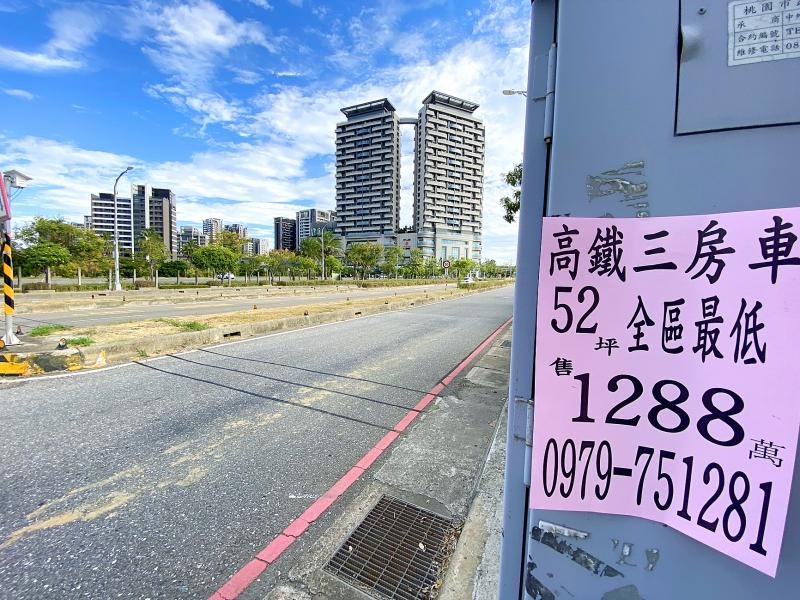Nearly 40 percent of Taiwanese expect housing prices to pick up this quarter and 10 percent predict a decline, while many expressed concern over inflation, Chinatrust Real Estate Co (中信房屋) said in a survey released yesterday.
Thirty-nine percent of respondents said that housing prices would rise in the next few months, Chinatrust Real Estate said, citing internal data.
Although the Chung-Hua Institution for Economic Research (中華經濟研究院) on Wednesday raised its forecast for Taiwan’s GDP growth this year to 5.84 percent from 5.16 percent, 42 percent of respondents said that the economy weakened last quarter from three months earlier, the real-estate broker said.

Photo: Hsu Yi-ping, Taipei Times
Restaurants and small and medium-sized retailers exited the market to stop losses after business failed to return to normal amid a level 2 COVID-19 alert, it said.
At the same time, sectors are complaining about escalating operating costs as prices for oil products, raw materials and commodities soar, it said.
Developers and builders have indicated chances are slim of price concessions in light of more expensive steel, wood, glass and other building materials, despite the government’s selective credit controls and unfavorable property tax terms, it said.
Construction might focus on apartments with a lower barrier to entry on cheaper land for the time being rather than more expensive projects, as prospective buyers might hesitate, Chinatrust Real Estate said.
For existing homes, sellers and buyers should iron out their pricing differences in a timely fashion to cope with inflation, which would eat away at wealth, it said.
About 75 percent of respondents said that things are much more expensive today than this time last year, including 30 percent who said that prices are “very expensive,” it said, adding that 45 percent said that things are “less expensive.”
Given that, respondents believe home prices would hold steady in the near future, it said.
People are willing to cut spending on clothing and recreation, if necessary, to cope with inflation, as they are not necessary items, the survey said.
Food and housing rank high on the list of concerns, as both are essential to maintain a decent life, it said.

With an approval rating of just two percent, Peruvian President Dina Boluarte might be the world’s most unpopular leader, according to pollsters. Protests greeted her rise to power 29 months ago, and have marked her entire term — joined by assorted scandals, investigations, controversies and a surge in gang violence. The 63-year-old is the target of a dozen probes, including for her alleged failure to declare gifts of luxury jewels and watches, a scandal inevitably dubbed “Rolexgate.” She is also under the microscope for a two-week undeclared absence for nose surgery — which she insists was medical, not cosmetic — and is

CAUTIOUS RECOVERY: While the manufacturing sector returned to growth amid the US-China trade truce, firms remain wary as uncertainty clouds the outlook, the CIER said The local manufacturing sector returned to expansion last month, as the official purchasing managers’ index (PMI) rose 2.1 points to 51.0, driven by a temporary easing in US-China trade tensions, the Chung-Hua Institution for Economic Research (CIER, 中華經濟研究院) said yesterday. The PMI gauges the health of the manufacturing industry, with readings above 50 indicating expansion and those below 50 signaling contraction. “Firms are not as pessimistic as they were in April, but they remain far from optimistic,” CIER president Lien Hsien-ming (連賢明) said at a news conference. The full impact of US tariff decisions is unlikely to become clear until later this month

GROWING CONCERN: Some senior Trump administration officials opposed the UAE expansion over fears that another TSMC project could jeopardize its US investment Taiwan Semiconductor Manufacturing Co (TSMC, 台積電) is evaluating building an advanced production facility in the United Arab Emirates (UAE) and has discussed the possibility with officials in US President Donald Trump’s administration, people familiar with the matter said, in a potentially major bet on the Middle East that would only come to fruition with Washington’s approval. The company has had multiple meetings in the past few months with US Special Envoy to the Middle East Steve Witkoff and officials from MGX, an influential investment vehicle overseen by the UAE president’s brother, the people said. The conversations are a continuation of talks that

CHIP DUTIES: TSMC said it voiced its concerns to Washington about tariffs, telling the US commerce department that it wants ‘fair treatment’ to protect its competitiveness Taiwan Semiconductor Manufacturing Co (TSMC, 台積電) yesterday reiterated robust business prospects for this year as strong artificial intelligence (AI) chip demand from Nvidia Corp and other customers would absorb the impacts of US tariffs. “The impact of tariffs would be indirect, as the custom tax is the importers’ responsibility, not the exporters,” TSMC chairman and chief executive officer C.C. Wei (魏哲家) said at the chipmaker’s annual shareholders’ meeting in Hsinchu City. TSMC’s business could be affected if people become reluctant to buy electronics due to inflated prices, Wei said. In addition, the chipmaker has voiced its concern to the US Department of Commerce